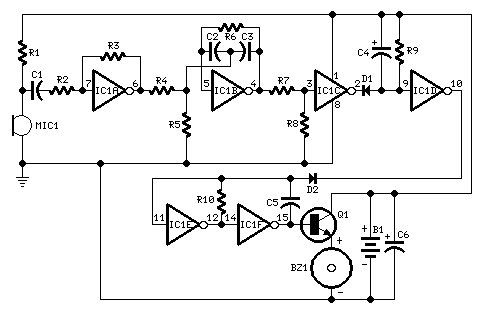Whistle Responder
Beeps when hears your whistle
A gadget suitable for key-holders, games etc.
Circuit diagram:

Parts:
R1_____________22K 1/4W Resistor
R2_____________10K 1/4W Resistor
R3______________4M7 1/4W Resistor
R4,R8_________100K 1/4W Resistors
R5____________220R 1/4W Resistor
R6____________330K 1/4W Resistor
R7_____________47K 1/4W Resistor
R9______________2M2 1/4W Resistor
R10_____________1M5 1/4W Resistor
C1,C5__________47nF 63V Polyester or Ceramic Capacitors
C2,C3__________10nF 63V Polyester Capacitors
C4,C6___________1µF 63V Electrolytic Capacitors
D1,D2________1N4148 75V 150mA Diodes
IC1____________4049 Hex Inverter IC
Q1____________BC337 45V 800mA NPN Transistor
MIC1_________Miniature electret microphone
BZ1__________Piezo sounder (incorporating 3KHz oscillator)
B1___________2.8 or 3V Battery (see notes)
Device purpose:
Some 15 years ago it was common to see small key-holders emitting an intermittent beep for a couple of seconds after its owner whistled. These devices contained a special purpose IC and therefore were not suited to home construction. The present circuit is designed around a general purpose hex-inverter CMos IC and, using miniature components and button clock-type batteries can be enclosed in a matchbox. It is primarily a gadget, but everyone will be able to find suitable applications.
Circuit operation:
This device beeps intermittently for approx. two seconds when a person in a
range of about 10 meters emits a whistle.
The first two inverters contained in IC1 are used as audio amplifiers. IC1A
amplifies consistently the signal picked-up by the small electret-microphone and
IC1B acts as a band-pass filter, its frequency being centered at about 1.8KHz.
The filter is required in order to select a specific frequency, the whistle's
one, stopping other frequencies that would cause undesired beeper's operation.
IC1C is wired as a Schmitt trigger, squaring the incoming audio signal. IC1D is
a 2 second (approx.) monostable driving the astable formed by IC1E & IC1F. This
oscillator generates a 3 to 5Hz square wave feeding Q1 and BZ1, thus providing
intermittent beeper's operation.
Notes:
- Power supply range: 2.6 to 3.6 Volts.
- Standing current: 150µA.
- Depending on dimensions of your box, you can choose from a wide variety of battery types:
- 2 x 1.5 V batteries type: AA, AAA, AAAA, button clock-type, photo-camera type & others.
- 2 x 1.4 V mercury batteries, button clock-type.
- 1 x 3 V or 1 x 3.6 V Lithium cells.
Title: Whistle Responder
electronic circuit
Source: www.redcircuits.com
Published on: 2005-02-10
Reads: 1138
Print version: ![]()
Other electronic circuits and schematics from Miscellaneous
-
Nocturnal Animals Whisker
-
Time Delay Relay II
-
Economy radar detector
-
Intercommunication (Intercom)
-
Digital Step-Km Counter
-
Cellular Phone calling Detector
-
Cuckoo sound Generator
-
Ultrasonic Pest Repeller
-
Time Delay Relay
-
Keys Finder
